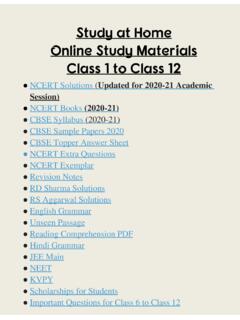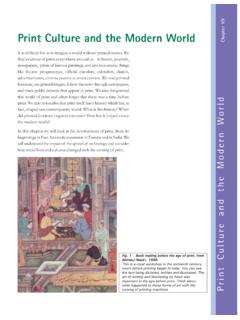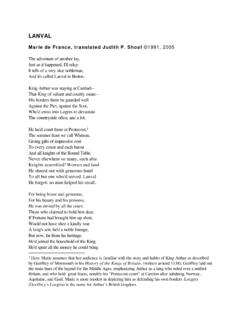Transcription of Chanakya Neeti - PDFDrive
1 Chanakya Neeti ( Chanakya 's Aphorism on Morality)Sutras of Chanakya includedeISBN: 978-93-5083-489-3 AuthorPublisher: Diamond Pocket Books (P) , Okhla Industrial Area, Phase-IINew Delhi-110020 Phone: 011-40712100, 41611861 Fax: 011-41611866E-mail: : 2013 Chanakya NEETIBy - ChaturvediIntroductionChanakya was an epoch-making personality. It was the time when India wasemerging out of the Dark Age . The old values were losing their relevance andthe new were yet to be established. It was an age of confusion, which permeatedevery walk of the society. The Dharma, so far a guiding and uniting force, wasbeing subjected to the contradictory interpretations. The factionalism andfundamentalism were raising their ugly heads and entering into the vitality of thesocial and religious norms. Taking the advantage of his confusion, Alexander ofMacedon invaded India with the help of the selfish rulers of some border witnessed and felt the severe trauma of this major invasion by a realforeigner.
2 Earlier all the invaders, who attacked us eventually settled in ourcountry itself. But Alexander s invasion was an attack of totally an alien cultureand army which had strong tradition and strength of their own glorious past. But,ironically, this shattering jolt helped efface the prevailing confusion in India andexpedited the emergence of a new system, which was in essence authored was the first thinker of the ancient times who nurtured the sense ofnationalism and inculcated in the minds of the people that they owed their basicallegiance to the Rajya (State of Nation) and not to the Dharma. Incontradistinction to the earlier concept he made the State had seen that in the absence of any omnipotent religious authority themisconstrued faiths were shattering the very structure of society and was needed the total change or renovation of the system.
3 But, there wereno guiding beacons to enlighten the people about this new system. Then hewrote two significant books the Arthashastra (known as Kautilya sArthashastra) and a collection of his observation on various practical aspects oflife entitled Chanakya -Niti . Chanakya Niti is, in fact, this great thinker s pithy observation to impart thepractical wisdom to the people of his time. But these teachings are sofundamental that it s relevance is almost ever lasting. Enshrined in the simplesense. Written in simple lucid language with clear thoughts, these observationshave not only withstood the test of time but many of phrases, like and havebecome the oft-quoted proverbs of our attempt has been to bring out their fullmeaning and interpret them in the context of the modern times so that theirundecaying relevance may be fully appreciated.
4 To bring home thefundamentality of these sayings, we have also compared them with theprevailing modern concept. The need for these rather lengthy explanations wasfelt owing to the occasional terseness of these observations. SometimesChanakya even contradicts his own, earlier observations, perhaps to reveal thefundamental truth by sheer contradiction. At times even some of the immoralteachings are the part of this book. But they appear immoral only at the primafacie viewing. While telling what we should learn from the other beings, Chanakya says: Prattutthaanam cha Yuddham cha Samvibhaagashcha Bandhushu , Learn from the cock the following four things: getting up at the right time,fighting bitterly, making your brothers flee and usurping their share also! Although apparently it appears down right immoral, this teaching is rooted inthe instinct of self preservation which is natural.
5 It is in this context that someof such unethical teachings are to be Chanakya is painted as a scheming manipulator who could stoop toeven the meanest level to serve his purpose, a few of his shlokas negate thisconcept and present Chanakya as a sort hearted and imaginative poet. He says: Bandhanaani Khal Santi BahuniPrem Rajju Krit BandhanmannyatDaarubhed Nipunoapi ShadanghriNishkriyo Bhavati Pankaj , there are many bondages but that of love is entirely different. Theblack-bee, which penetrates through even wood, gets inertly enclosed in the foldof the lotus flowers. Who can consider the author of this Shlok to be a hardhearted man?There might be certain aphorisms which might appear objectionable to somepersons, especially those who discuss the role of women in our shares the same thoughts as these were prevalent during this time orare still prevalent in certain sections of our society.
6 The entire Hindu thoughtgives only two positions to women: either they are adorable or they are like anyother pleasure source to enjoy. The sense of companionship, which is clearly anoccidental concept, is missing for obvious reasons. Well, nobody can be perfectin the world. Even the greatest thinkers of the world had some kind of Achillesheel. A man is a product of the social set up. No doubt, Chanakya tried to affecta change but even he could not get rid himself of some diehard these minor short comings, Chanakya s teachings have greatsense. One can say this not only from the textural importance of this collectionbut also from the end result of such teachings. Chanakya believed not onlyimparting instructions but also seeing their practical records that Chanakya not only carved out a massive empire for hispet disciple Chandragupta but also created such an awareness in the generalmasses that they began to talk about a Rashtra or a Nation instead of a State or a Rajya.
7 And what could be a greater proof of the soled result of Chanakya steaching than for a coming full millennium. No major invasion was undertakentowards the Indian borders. And the social, civil and political norms that heestablished had the concept of democracy in its embryonic form. Chanakya isone of those few great persons whose greatness enhances with the passage text used in the book is taken from the standard text first published inPoona in the last century. Although every effort is made to cross-check anyinterpolation in it, looking to the antiquity of this treatise, there could be somestill creping into it. In this collection, we have culled only those aphorismswhich give a fundamental or universal message. Lastly, the translator conveyshis deep gratitude to Mr. Narendra Kumar of the Diamond Pocket Books forgiving him an opportunity to study and translate these pearls of wisdom.
8 ChaturvediContentsIntroductionThe IndividualSocietyGood CompanyGeneral ObservationsMiscellaneousSutras of ChanakyaThe Individual(The basic purpose of Chanakya -Niti is to impart knowledge on everypractical aspect of life. And in this context, he has touched upon various factorsdealing with faith and culture, from the individual s point of view.) Riches,vitality, life, body all are fickle and fey; only Dharma is constant andeverlasting.*God s abode is not the idols of wood, stone or earth. He dwells only infeeling.*But, even if one puts one s faith in the idols of gods made of metal, wood orstone and worships them with total devotion, one is awarded with the desiredresult.*Anger is death, Lust is (the river of hell) Vaitarani, Knowledge is the cow ofplenty and Satisfaction is (the divine orchard) 1 Pranammya Shirsaa Vishnum Trailokyaadhipatim Shaastroddhrootam Vikshye Rajneeti salute to the Lord of the three realms, Lord Vishnu, and now commence todescribe the principles of the statecraft culled from various ancient books ofknowledge.
9 2 Dharme Tattpartaa Mukhe Madhurtaa Daane SamuttsaahataaMittreavanchakataa Guru Vinyataa Chitteapi Shuchitaa Gune Rasiktaa Shaastreshu VigyataaRoope Sundartaa Shive Bhajantaa Tvayasti Bho in faith, sweetness in voice, alacrity in alms-giving, guilelessness inrelation with friends, humility for the Guru, depth in character; piety inbehaviour, regard for merit, erudition in scriptural knowledge, beauty inappearance and belief in Lord Shiva (or in the welfare of all) are, O Raghav(Lord Rama), your attributes! : : : : : : : : 3 Kaashtham Kalpataruh Sumerurachalashinintaamanih PrashtarahSoonyasteevrakarah Shashih Kshayakarah Kshaarohi Nashtatanurbalirditishuto Nittya Prashuh KaamagohNaittaaste Tulayaami Bho Raghupate Kassyopabhaa (The divine tree fulfilling all desires) is wooden: the Sumeru is ahill, the philosopher s stone is but a stone; the sun has scorching rays, the moonis waxing and waining, the sea ( water) is saline, the Kamadeva (the god of love)is bodyless; Bali is a demon, the cow of plenty is an animal--O Ram!
10 I fail tocompare you with anyone ( , everything with best of the attributes have someinherent defect in it): You are incomparable. : 4 Kaa chintaa Mam Jeevane Yadi Harirvishvambharo geeyateNo chedarbhakjeevanaarth Jananeestannyam Kutham Muhurmuhuryadu Pate Laxmipate KevalamTvattapaadaambujsevanen Satatam Kaalo Mayaa should I worry for life as Lord Hari is the sustainer of the world. Had itnot been so then how come a mother s breasts be filled with milk for her infantautomatically? Believing this (that he who creates life also provides for itssustenance) O spouse of Lakshmi! I pass my life devoted to your feet!God : : 5 Pushpe Gandham Tile Tailam Kaashthe Vahannih Gudam Tathaa Dehe Pashyaattmanam dwells in our bodies, life fragrance in flowers, oil in oil seeds, fire inwood, ghee in milk, jaggery in the sugarcane. The wise should understand this.








